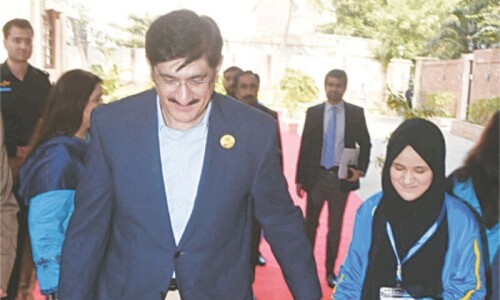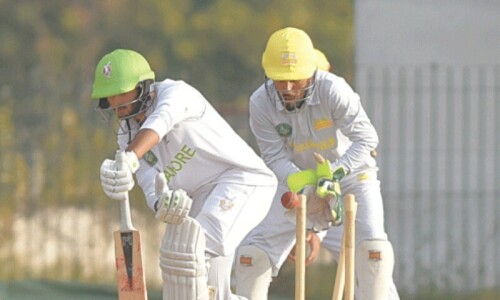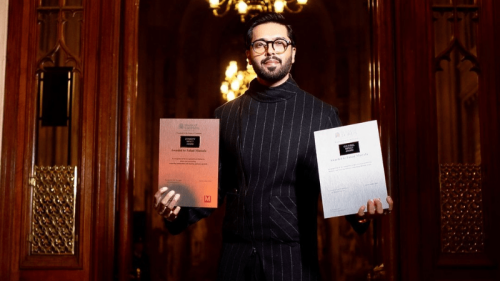SOME have tried to make us believe that what Muhammad Ali, the boxing legend, once uttered must be considered the world’s shortest poem. He said: “Me Whee!”
On the other hand, Aram Saroyan’s poem that consists of just one word — and that too spelt incorrectly — was touted as the world’s shortest poem. It read: “lighght”.
This “poem” was included in ‘The American literary anthology’ and became the world’s most controversial poem, too, when it was awarded a cash prize of $500, involving one of the US government departments.
Yet another weird “poem”, if can be called so, is also “written” by Aram Saroyan (though I doubt one can call it either a “poem” or “written”). The “poem” is in fact an image of what seems like a four-legged letter “m”, or, maybe, the letter “m” and the letter “n” are seen conjoined in the image.
Interestingly, somebody tried to decipher the meaning of the so-called poem and came up with the explanation, which is: “a close-up of an alphabet being born”. If this poem is any standard to go by, the world’s shortest poem title must go to this poem that I just composed: “!”. Maybe, after looking at this exclamation mark, you will claim to have written the world’s shortest poem by putting just a full stop on a blank sheet of paper. A new kind of poetry, albeit it has got limited popularity, is known as “visual poetry”, in which symbols and images are mixed to convey the message. A dot is an image and a symbol as well, so a full stop must get the runner-up prize at least.
Jokes aside, a quatrain, or ruba’i, is probably the world’s shortest poem. A lovely genre of Persian and Urdu poetry, a ruba’i consists of just four lines and the poets must say whatever they want to convey in these four lines which have to be on one topic and, unlike ghazal, must be interconnected. Also, ruba’i must have at least three rhyming lines and be composed in any of the 24 specific poetic measures of the meter called ‘bahr-i-hazaj’. Precisely because of these limitations, ruba’i is considered one of the most difficult poetic genres to master.
Hamid Hasan Qadri, a well-known critic and researcher of Urdu, once wrote: “Ruba’i, that unique, strange and elegant genre, is peculiar to Urdu and Persian. No other language has so brief a poetic genre”.
The word ruba’i itself comes from an Arabic root meaning ‘four’. But Arabic poetry does not have any such genre. The other names given to ruba’i include tarana, do baiti, chahar misra’i, and chahar baiti. An interesting debate as to whether or not every four-line poem can be called ruba’i ensued when Andaleeb Shadani said the four-line poems by Allama Iqbal, titled as ‘rubaiyat’, were not qita’as, as some thought, and they must be called ruba’i. Contrary to the general perception, Shadani thought that since the Persian short poems composed by Baba Tahir Uryaan were called ruba’i and Iqbal’s four-line poems were in the same ‘vazn’, or poetic measure, as Uryaan’s poems, there was no harm in calling these poems by Iqbal ruba’i instead of qita’a.
Dr Farman Fatehpuri took exception to it and proved that these poems or qita’as by Iqbal could not be called ruba’i since they did not conform to the strict criterion of 24 specific measures of the meter hazaj (these poems are in the same meter, bahr-e-hazaj, but ‘vazn’, or poetic measure, is different). In fact, Farman Fatehpuri’s book ‘Urdu ruba’i: funni-o-tareekhi irteqa’ was first of its kind and despite being a brief one, it captured the essence of ruba’i’s technical aspects, its history in Urdu and Persian and Urdu’s great poets of ruba’i.
In this book, Farman sahib writes that the western literatures does not have any parallel to ruba’i and the reason, as he puts it, is that the western tastes are different and in the east different musical notes and different poetic rhythms are favoured.
It is a fact that until Edward Fitzgerald’s translation of rubaiyat of Umar Khayyam was published, knowledge about this genre in the west was not common. Though Fitzgerald did not translate Umar Khayyam’s quatrains in their entirety and the ones he translated, too, do not paint a good or true picture of either Persian poetry or Khayyam since the translation is not faithful and the quatrains translated into English mostly pertain to drinking and merrymaking.
Despite Khayyam’s popularity, the ruba’i could not take root in the western soil and some humorists even wrote parodies of Khayyam’s rubaiyat. One such parody was named ‘The Rubaiyat of Omar Khayyam Jr’, and another ‘The Rubiyat of a Persian kitten’.
Just like Urdu marsia, Urdu ruba’i originated in Deccan under the influence of Iranian courtiers. In the Northern India, Mir Dard, Mir Taqi Mir and Mirza Sauda are considered among the finest of ruba’i poets. In the later era, Maumin, Zauq and Zafar are considered prominent poets of Urdu ruba’i. But the fact is that just like Urdu marsia, Urdu ruba’i reached its pinnacle in Lucknow. And in Lucknow, no poet equals Mirza Dabeer and Mir Anees when it comes to the beauty and artistic elegance in ruba’i.
Mir Anees is not only the greatest of all ruba’i poets but he surpasses all others when one looks at the number of ruba’is he has composed. According to Dr Farman Fatehpuri, Dabeer composed about 200 ruba’is, while Anees has to his credit about 550 quatrains. The Rubaiyat of Anees were published in different volumes and by different publishers. About three decades ago, Ali Jawad Zaidi compiled a new edition and it contained, in alphabetical order, exactly 583 rubaiyat of Anees.
Now Lahore’s Sang-i-Meel Publications has come up with a new edition of Anees’s quatrains. Compiled by Syed Taqi Abedi, the book contains 579 raba’is. Accompanied with detailed preface and critical evaluation of Anees’s poetry by the compiler, the book enlists Anees’s rubaiyat under the headings such as philosophical, religious, moral, elegiac quatrains etc.
Published in Dawn, November 3rd, 2014















































Dear visitor, the comments section is undergoing an overhaul and will return soon.